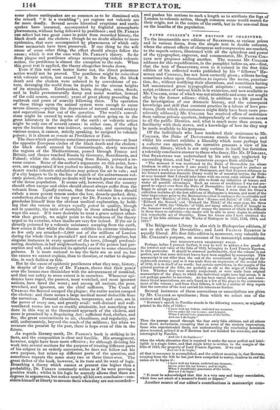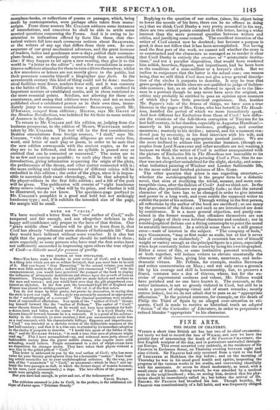PAYNE COLLIER'S NEW EDITION OP SHAKSPERE. To the innumerable new
editions of SHAKSPERE, at various prices and in various forms, from the simple text in double columns, where the utmost effects of cheapness and compression are reached, to the superb octavo, illustrated with all the splendour and power of the typographer, engraver, and commentator, Mr. PAYNE COL- LIER now proposes adding another. The reasons Mr. Commis adduces for this republication, in the pamphlet before us, are—first, that the text of SHAIISPERE, even as it existed in the first folio edition of his collected works published by his " fellowes "
Hz- SuRGE and CORDELL, has not been correctly given ; editors having sometimes taken upon themselves to improve the metre, punctua- tion, &c., without notifying their alterations, and sometimes having left uncorrected gross typographical misprints : second, manu- script evidence of various kinds is in existence, and now available to Mr. COLLIER' some of which was not attainable and some not sought after by the former editors : third, in addition to a life passed in the investigation of our dramatic history, and the consequent knowledge and skill that constant practice in a labour of love pro- duces, (both which circumstances might fairly have been more pro- minently adduced,) Mr. COLLIER has received offers of assistance from various private quarters independently of the common access to all the public libraries, and, what is much more than access, a familiarity with their stores, and a knowledge of how far they may be made available to his purposes. Of the individuals who have tendered their assistance to Mr. COLLIER, the Duke of DEVONSHIRE stands the foremost ; and whilst his conduct exhibits a liberality which none perhaps but a collector can appreciate, the narrative presents a view of his dramatic library, which is not only curious in itself; but furnishes a tolerably conclusive answer to those who fancy, like Mr. D'IsasEr.r, that SHAKSPERE was undervalued by his own age, neglected by succeeding times, and had "numerous escapes from oblivion"! "The moment it was mentioned to the Duke of Devonshire (to whose kindness in other respects I owe much) that I had engaged to produce so important a work as a new edition of Shakspeare, and that frequent reference to his Grace's matchless dramatic library would be of essential service, the Duke at once insisted that I should take home with me every early edition of Sliak- spere in his library, that I might be able to finish my collations at leisure, and under all possible advantages. Such an excess of confidence I was not pre- pared to expect even from the Duke of Devonshire; but of course I was most happy to accept so extraordinary a favour. When I state that his Grace's collection includes all the first editions of Shakspeare's dramas, and most of the later impressions prior to the Restoration—that it embraces the inestimable and unique first Hamlet,' of 1603, the first 'Romeo and Juliet,' of 1597, the first 'Richard the Second,' and 'Richard the Third,' of the same year, the three Learn,' of 1608, the ' Othello ' of 1622, and many others, which if brought to the hammer would produce a sum of money the amount of which it is difficult in these times to calculate—the reader will be able in some degree to estimate this remarkable act of liberality. From his Grace also I have obtained the loan of his folio editions of the Works of Shakspere in 1623, 1632, 1664, and 1685."
The Bridgewater Library is also rich in Shaksperian editions, if not so rich as the Devonshire ; and Lord FRANCIS EGERTON is equally liberal. His first folio edition is, moreover, very valuable for Mr. COLLIER'S purpose, on account of its manuscript annotations.
THE BRIDGEWATER SIIAKSPERE FOLIO.
Perhaps, before I proceed further, it may be well to adduce a few proofs of the interest and value of the folio of 1623, belonging to Lord Francis Egerton, in this particular. It should be observed preliminarily, that the volume is not perfect, and that some deficient leaves have been supplied by manuscript. This manuscript is not older than the end of the seventeenth or beginning of the eighteenth century; and as it was made from an impression of the second folio of 1632, it is in itself of no worth: but certain corrections, in the margin of the printed portion of the folio, are probably as old as the reign of Charles the First. Whether they were merely conjectural, or were made from original manuscripts of the plays, to which the individual might have had access, it is not perhaps possible to ascertain. As has been stated, these verbal, and some- times literal annotations, are only found in a few of the plays in the commence- ment of the volume ; and from what follows, it will be a matter of deep regret that the corrector of the text carried his labours no further.
Several instances of these corrections or emendations are given by Mr. COLLIER as specimens ; from which we select one of the easiest and happiest.
" Bertram's speech to Parolles stands in the following manner, as originally printed in the folio of 1623—
• I have writ my letters, easketed my treasure, Given order for our horses; and tonight,
When I should take possession of the bride.
And ere I do begin.'
Thus the passage passed through the four early folio editions, and all others from Rowe downwards excepting that in some of the modern impressions, those who superintended them, not understanding the concluding hemistich above inserted, printed it as if Bertram had not finished his sentence, and was interrupted by Parolles,
' And ere I do begin—' when the whole alteration that is required to make the sense perfect and intel- ligible is a single letter, and that single letter is written in the margin of the folio of 1623, the property of Lord Francis Egerton. If we read
Bud ere I du begin,'
all that is necessary is accomplished, and the evident meaning is, that Bertram, escaping from the wife he has just been compelled to marry, resolves to end the union ere he begins it : • I have writ my letters, easketed my treasure, Given order for our horses; aud to night, When I should take possession of the bride,
End ere ide begin.'
"It must be acknowledged that this is a very easy and happy emendation, which does not admit of a moment's doubt or dispute."
Another source of our editor's contributions is manuscript corn-
monplace-books, or collections of poems or passages, which, being .made by contemporaries, were perhaps often taken from manu- scripts. From these sources Mr. COLLIER adduces some instances of emendations, and conceives he shall be able to settle some mooted questions concerning the Poems. And it is owing to in- attention to indications offered by facts like these, that rhe- torical writers fall into such erroneous notions about SHAKSPERE, or the writers of any age that differs from their own. In con- sequence of our great mechanical advances, and the great increase of readers, ladies and gentlemen now-a-days publish their common- place-books, not unfrequently representing them as something else : if they happen to hit upon a new reading, they give it to the world in "a letter to the editor" ; and a few emendations is some- times a sufficient stimulus for them to turn editors themselves; whilst a few anecdotes or letters are not merely given to the public, but their possessor conceits himself a biographer ipso facto. In the seventeenth century this kind of thing could not be done : mecha- nical facilities were fewer, readers fewer still, and it was contrary to the habits of life. Publication was a great affair, confined to important matters or established merits, and in them restricted to the more essential points. Sciolists, not allowing for these cir- cumstances, and seeing that editions were fewer, and not so much published about a celebrated person as in their own time, imme- diately jump to erroneous conclusions : SHAKSPERE, quoth Mr. D'IssarLr, escaped from oblivion ; MILTON, says Mr. GRANT of the Random Recollections, was indebted for his fame to some notices of ADDISON in the Spectator. To return to Mr. COLLIER and his edition, or, judging from the business prospectus, to the edition of Messrs. WHITTAKER under- taken by Mr. COLLIER. The text will be the first consideration. Besides emendations from foreign sources, "I shall," says Mr. COLLIER, "with the most plodding diligence go over every line, word, and letter of each play or poem, in order to be sure that the new edition corresponds with the ancient copies, as far as they are to be followed, and that no syllable is passed over or omitted that can be corrected or recovered." The notes are to be as few and concise as possible ; to each play there will be an introduction, giving information respecting the origin of the plots, the performance of the drama, and other matter connected with it ; the more striking and valuable remarks of different critics will be embodied in this edition ; the order of the plays, since it is impos- sible to ascertain their exact chronology, will be that adopted by the player-editors in the first folio edition ; and a life of the poet will be given. The publication will consist of "eight handsome demy octavo volumes" ; what will be its price, and whether it will be illustrated, we do not know. The specimen-page prefixed to Mr. Com:ivy's pamphlet is a good and bold but not strikingly handsome type ; and, if it exhibits the intended size of the page, the margin will be small.



























 Previous page
Previous page